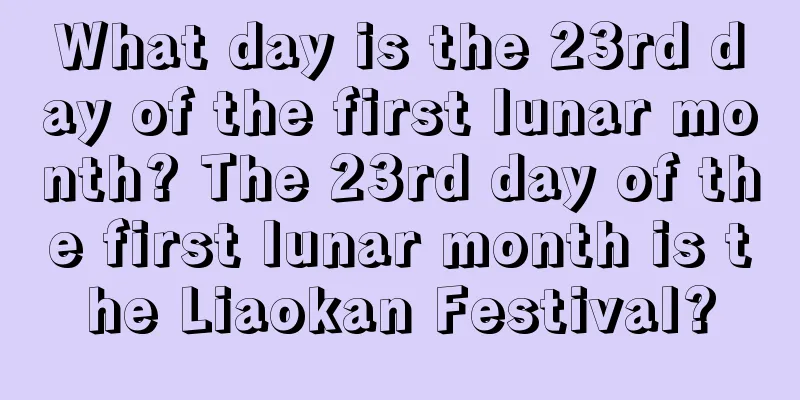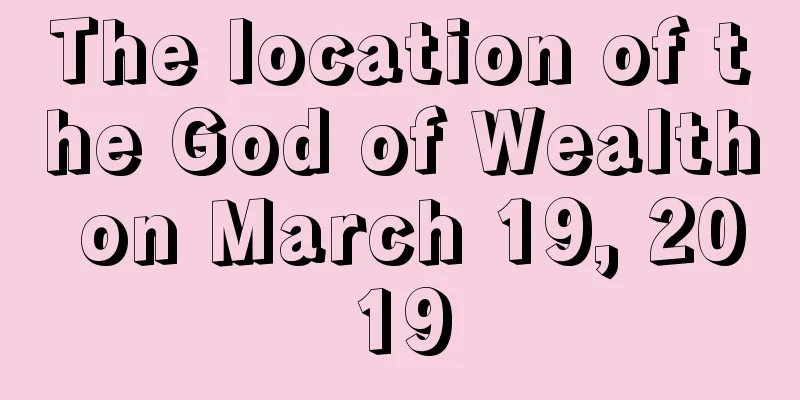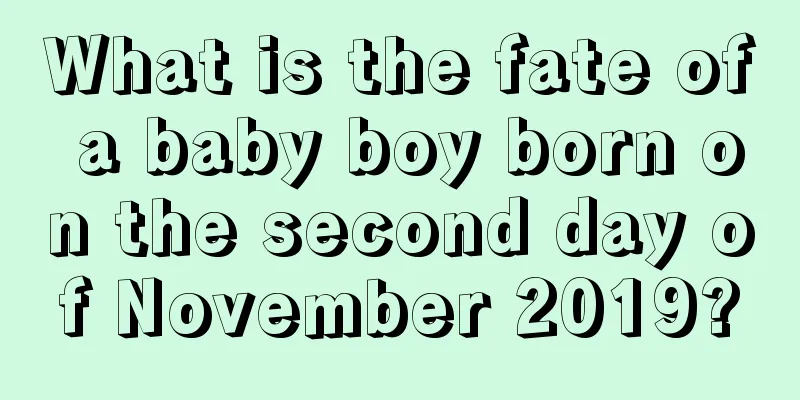What day is the 23rd day of the first lunar month? The 23rd day of the first lunar month is the Liaokan Festival?

|
Introduction: Do you know what festival is on the 23rd day of the first lunar month? The 23rd day of the first lunar month is the Liaokan Festival for people in the mountain city, and it is also the last festival in the first lunar month. What kind of festival is Liaogang Festival? What are the traditional customs and activities? With these questions, please follow the editor to learn more! There is no end to the topics about the Spring Festival, so do you want to know more about it? Just continue to wander in Mr. Shui Mo’s Spring Festival special ocean! "On the twenty-third day of the first lunar month, every household burns its candles to celebrate the New Year!" This is a folk song that is familiar to all the locals. The 23rd day of the first lunar month is the last festival in the first lunar month. On this day, we welcome the Kitchen God and celebrate farming. The old people say that this day must be prosperous so that there will be a good harvest in the coming year, and the family will be harmonious and prosperous. It is also the annual bonfire festival, which is called "Liaogan" in my hometown dialect. No other bonfire party can compare with it because of its natural beauty, simplicity and fascinating. After the 23rd day of the first lunar month, young people who go out to work have gradually bid farewell to their families, packed their bags, and headed towards the outside world. Legend has it that "rickets" is a very stubborn virus, and only by burning it with fire can the poison be driven out and the disease be eliminated. People believe that by burning the scald they can get rid of diseases and disasters, ensure a good harvest and make a good start for the new year. This custom is particularly popular in rural areas, and is now equally popular in cities. The children would go to prepare firewood early, and use sickles to cut bundles of wormwood on the barren hills. The children would compete to see who could cut more firewood. “The grass on the plain is withered and green every year.” After the bundles of wormwood were cut, they would be placed in front of and behind the house, ready for use when it was time to burn the wormwood. The old people would cut some "malnut dolls" out of yellow paper, and the children would poke small holes in them with burning incense sticks, and then rub the "malnut dolls" all over the body to wipe off all the malnutrition. The old people said that if you make a "malnut doll", you will be free from all diseases and be healthy for the whole year. The dinner on the day of "Liaokan" is "Jiaotuan". It is said that eating "Jiaotuan" will keep the rickets away and will not bring harm to the world. When night falls, a pile of firewood and sundries cleaned up from the yard that day are piled in front of every house, and then the "Liaokan doll" is inserted, and the torn couplets and door gods are also thrown in and lit together. Then incense sticks, firecrackers, salt grains, onion skins, garlic skins, etc. are thrown in, and the firewood is lit to burn the "Liaokan doll" with fire. At this time, flames flickered in front of every house, piles of torches lit up the courtyards and even the villages red, and the flames and the sounds of firecrackers intertwined with each other. People were jumping around on the fire, hoping to ward off disasters and misfortunes, burn away past misfortunes and bad luck, and spend the new year in a prosperous and festive atmosphere. Adults often jump a few times symbolically and then stand aside to watch, but children are different. Especially half-grown boys who love playing with fire are usually restricted by their family’s education and traditional fire ban and dare not play with it. Festivals give them a reasonable opportunity to indulge themselves, so how can they miss it? Let them run wild and jump around like wild horses. The original origin of this custom was to pray to the gods to protect the health of the dolls, and they unsurprisingly became the protagonists of the entire event. If a broken doll or a female doll dare not jump over the fire, an adult will hold the doll and make it jump over the fire, or the adult will hold the doll's hands in each hand and swing it over the fire. The older kids were not afraid at all. They put all their efforts into it and scrambled for it. Just like in the long jump, they ran as fast as they could and used inertia to jump over the fire happily, competing to see who could jump the best. Occasionally, there would be chaos and people would jump towards each other at the same time and bump into each other, falling down and burning their clothes, eyebrows and hair, or hitting their heads, and jumping into the fire would escalate into a "bumping meeting"; sometimes, naughty and bandit children would take the opportunity to play pranks and scare people, secretly throwing a few firecrackers into the fire, and when someone jumped over it, sparks would fly everywhere. When their own fire went out, they would rush to another house, jumping around to enjoy the feast of fire, and would not stop until all the fires in the village were extinguished. If people live in a concentrated area, neighbors will often pile up firewood together in advance and dance together. The flames light up the sky. The scene is lively and tense, and the atmosphere is intense. If anyone fails to jump over it, there is a risk of burning their cotton pants or eyebrows. This is the best test of the children's courage and strength. After dancing in one house, they would rush to another, enjoying the feast of fire until all the fires were extinguished. The flames died down, and slowly only a pile of red fire seeds were left. At this time, the man of the house, who was also the shopkeeper, would take out a new bamboo broom, raise it high, and then beat it hard at the fire seeds, shouting loudly: "Wheat flowers, corn flowers, sorghum flowers, soybean flowers..." With a clap and a shout, the old man said that the more and higher the fire seeds that pop up, the better the harvest of this crop will be this year. Looking at the fire seeds that are as brilliant as fireworks, everyone's sun-colored faces are filled with smiles, and their eyes are filled with thoughts of a prosperous year. The city was also filled with laughter and joy. People in the residential area put the cut wormwood together and burned it. Some units also joined in. Under the reflection of the flames, the whole city was in a sea of fire. Smiling faces danced and screamed happily in the spring breeze. The new year and new atmosphere were all reflected in this "burning wormwood" festival. On this day, all people and livestock take a day off. "On the twenty-third day of the first lunar month, old cows and horses take a day off." This means that after the twenty-third day of the first lunar month, the old years are over and it is time to start preparing for spring ploughing. The sound of "dong dong clang" became farther and farther away and gradually could not be heard anymore. Night fell heavily and the mountain city that had been bustling all night fell into a peaceful sleep. People also lay down comfortably in their warm beds and fell asleep contentedly. Perhaps that night, many people’s dreams were filled with the sound of “dong dong qiang” and “dong dong qiang”, and they saw the smiling faces of the villagers, the golden ears of wheat and the heavy corn cobs on the ground. When they squinted their eyes, they also saw the golden sun. In that warm light, the farmers fell asleep soundly and contentedly… Summary: The above article is a detailed introduction to the Liaogan Festival on the 23rd day of the first lunar month. You can learn more about it. I hope that in the new year, all readers will have happy families and all will go well! After reading this article, there are more exciting content in the Spring Festival special topic, let’s take a look! |
<<: What day is the 20th day of the first lunar month? What are the customs?
Recommend
Is the fifth day of the fourth lunar month in 2018 suitable for offering sacrifices?
Sacrifice is an important part of our Chinese etiq...
Is the fourth day of the first lunar month in 2018 a good day? Is it suitable for burning incense and praying?
Introduction: Burning incense and praying for bles...
What are the auspicious days for setting up the bed in February of the lunar calendar in 2019?
Introduction: In the traditional culture of our co...
Is the first day of the eighth lunar month in 2021 a good day? Can we offer sacrifices?
There are certain rules and regulations for choosi...
Is it suitable to repair graves on October 20th of the lunar calendar in 2019? Is today's hexagram a bad one?
Introduction: It is also necessary to choose an au...
Is it taboo to decorate on the 15th day of the first lunar month, the Lantern Festival in 2020? Will highways be free on the Lantern Festival in 2020?
Introduction: It is also necessary to choose an au...
Can I get a haircut on October 28th of the lunar calendar in 2018? How good or bad will this day be?
The second day of the second month in the lunar ca...
Query the location of the God of Wealth on the 23rd day of the 12th lunar month in 2018
Shui Mo Xiansheng website has carefully compiled ...
Is the Frost Descent solar term a good day? What does it mean?
Frost Descent is the eighteenth solar term in the ...
Is it a good time to travel on May 20, 2022? Is it an auspicious day?
Is it a good time to travel on May 20, 2022? Is it...
Is it a good idea to get a haircut on the 24th day of the seventh lunar month (9.11) in 2020? What does the hexagram look like?
In life, according to our Chinese traditional cust...
Is it a good idea to travel far away the day before the Ghost Festival in 2019? Analysis of the specific time for visiting graves on Ghost Festival!
Introduction: When traveling far away, you usually...
2017 Lunar November 26th Hour Auspicious and Unlucky Query, Hour Auspicious and Unlucky Query
In the eleventh month of the lunar calendar, whet...
What day is Double Ninth Festival in 2021? The significance of the Double Ninth Festival
The ninth day of the ninth month of the lunar cale...
Is July 14th of the lunar calendar in 2021 an auspicious day? How is it calculated?
Auspicious day. Chinese people care about having g...









